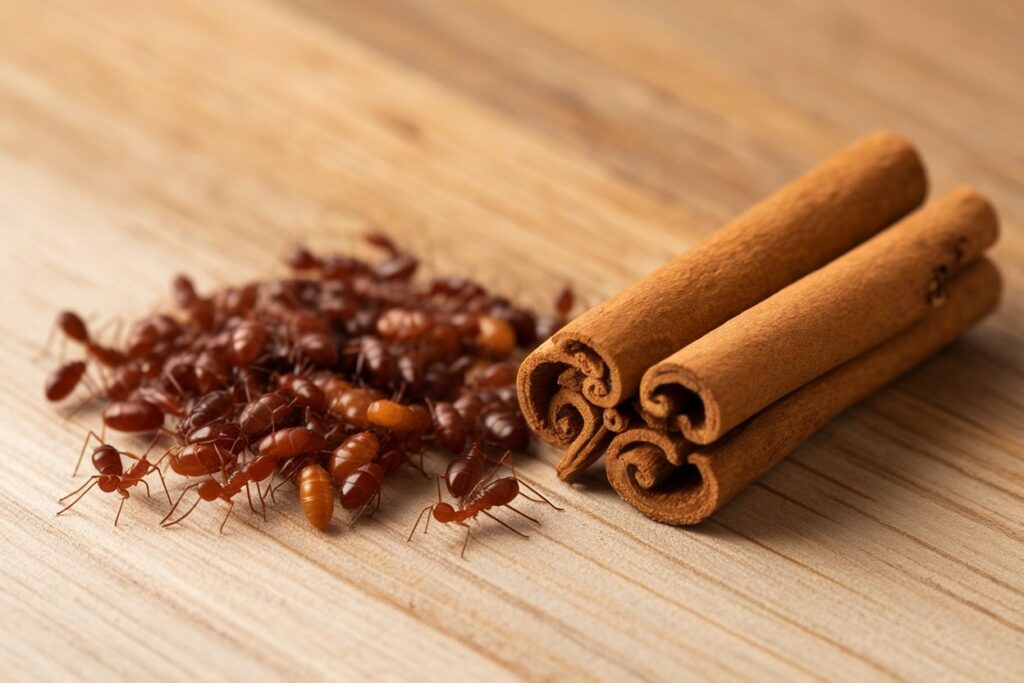So does cinnamon repel bugs? Well, homeowners are looking for green ways to keep bugs away and they’re finding that cinnamon, a common spice, might be the answer. It’s a natural way to fight off pests without using harsh chemicals.
Cinnamon could be a game-changer for those who don’t want to use synthetic pesticides. Its natural properties make it a strong contender for keeping bugs out of homes.
People who care about the environment are excited about cinnamon’s bug-fighting abilities. It’s easy to find, cheap, and comes from nature. This makes it a great choice for those who want to manage pests in a sustainable way.
We will look into how cinnamon works against bugs. We’ll explore its effectiveness, how to use it, and any downsides to using it as a natural repellent.
Understanding Cinnamon’s Natural Insect-Repelling Properties
Nature has given cinnamon special powers to fight off pests. Its complex chemistry helps protect against many insects. This makes cinnamon a great natural way to keep pests away.
Chemical Compounds in Cinnamon
Cinnamaldehyde is the main ingredient in cinnamon that keeps bugs away. It works like a strong insect poison, messing with their nervous systems. The bark of cinnamon has lots of this compound, making it a strong natural repellent.
“The power of cinnamon lies in its molecular structure, which acts as a natural defense mechanism against unwanted insects.” – Botanical Pest Control Research Institute
How Cinnamon Affects Insects
When insects meet cinnamon essential oil, it messes with their brains. The chemicals in cinnamon overwhelm their senses. This makes it hard for insects to survive or find a place to live. So, cinnamon is a top choice for organic pest control.
Different Forms of Cinnamon for Pest Control
Cinnamon comes in many forms to help fight pests. Ground cinnamon can act as a barrier. Cinnamon essential oil is very strong. Cinnamon sticks can be used to keep pests out of homes and gardens.
Common Household Pests That Cinnamon Repels
Cinnamon is a strong natural defense against many household pests. It helps homeowners fight off unwanted insects with its unique scent.
Ants are one of the main pests cinnamon keeps away. They quickly leave when they smell cinnamon. Spiders also don’t like cinnamon, making it a great natural way to keep them out.
Mosquitoes have a hard time with cinnamon too. The oils in cinnamon make it hard for them to stay. Cockroaches also don’t like cinnamon’s smell, helping to keep them out of kitchens.
Fruit flies are another pest cinnamon keeps at bay. By placing cinnamon in areas where fruit flies might breed, you can cut down their numbers. This way, you avoid using harsh chemicals.
While cinnamon can’t get rid of all pests, it’s a safe and green alternative to chemical pest control. It’s a good choice for those who want to avoid harsh chemicals in their homes.
Does Cinnamon Repel Bugs Effectively?

Looking into cinnamon as a natural bug repellent is quite interesting. Scientists are checking if it can replace chemical bug sprays.
Scientific Research and Studies
Studies on pest control show cinnamon might be effective. Lab tests found that cinnamon’s compounds, like cinnamaldehyde, keep bugs away. It messes with bugs’ senses and their ability to reproduce.
“Cinnamon’s natural properties offer a compelling alternative to synthetic pest control methods.” – Dr. Elena Rodriguez, Entomological Research Institute
Effectiveness Duration
How long cinnamon keeps bugs away depends on how it’s used and where. Cinnamon oil can protect for 2-4 hours. Powdered cinnamon lasts a bit less. Outdoor use doesn’t last as long as indoor.
Factors Affecting Performance
Several things affect how well cinnamon repels bugs. How much cinnamon you use is very important. More cinnamon means better bug protection. Things like humidity, temperature, and air movement also matter a lot.
Cinnamon is a good option for bug control, but it’s best used with other methods too.
Best Methods to Use Cinnamon as a Bug Repellent

DIY repellents with cinnamon are a natural and effective way to keep bugs away. Homeowners can use simple cinnamon-based solutions to protect their homes from unwanted pests.
Cinnamon spray is an easy solution for fighting insects. Mix ground cinnamon with water in a spray bottle. Shake it well and spray around entry points, windowsills, and areas with lots of bugs. The strong smell of cinnamon can stop pests from moving in.
Cinnamon sachets are another smart way to control bugs. Fill small cloth bags with ground cinnamon or cinnamon sticks. Put these sachets in closets, drawers, and storage to keep moths, ants, and other small bugs away.
Putting cinnamon-based repellents in the right places can really help. Sprinkle cinnamon powder around plants to protect your garden. Or, make a barrier around your home’s foundation. The powder keeps crawling bugs from getting in.
To get the best results, mix different ways of using cinnamon. Switch between sprays, sachets, and powder barriers to keep your home bug-free.
Combining Cinnamon With Other Natural Repellents
Natural pest control blends are a great alternative to harsh chemicals. Cinnamon is a key ingredient in making effective insect repellents. Homeowners looking for green solutions can mix cinnamon with other essential oils.
Essential oil synergy makes cinnamon repellents even stronger. Some essential oils boost cinnamon’s power to keep pests away.
Complementary Essential Oils
Peppermint, lavender, and eucalyptus oils make great blends with cinnamon. Together, they fight off different pests better than single ingredients. Peppermint stops ants, and lavender keeps mosquitoes at bay.
Creating Effective Repellent Mixtures
Make your own safe repellent by mixing 10 drops of cinnamon oil with 5 drops of peppermint oil. Use coconut oil as the carrier. This mix keeps many household pests away.
Application Tips and Safety
“Safety first when creating natural pest control solutions” – Botanical Research Institute
Always dilute essential oils right and test them first. Use glass or stainless steel for mixing. Keep repellents out of sunlight. Pregnant women and pets need extra care with these blends.
Limitations and Considerations When Using Cinnamon
Cinnamon can be a natural way to keep bugs away, but it’s not without risks. Some people might have allergies to cinnamon. This can cause problems for those with sensitive skin or breathing issues.
It’s also important to think about pet safety. Cats and small dogs might not handle cinnamon well. Before using cinnamon to keep pests away, talk to a vet.
Using too much cinnamon can harm the environment. It might upset the balance of local ecosystems and affect good insects. It’s key to use cinnamon in a way that doesn’t hurt nature.
The way cinnamon works can change based on where you live. Things like humidity and temperature can affect its bug-repelling power. So, it’s best to use cinnamon as just one part of your pest control plan.
People with breathing problems, pregnant women, and families with young kids should be extra careful. Always do a patch test and start with a small amount when trying cinnamon as a bug repellent.
Final Thoughts
Cinnamon is a great choice for those who want to control pests in an eco-friendly way. It’s a safe alternative to harsh chemicals. This makes it perfect for those looking for green pest control options.
Cinnamon can help keep many household insects away. It’s not a full replacement for professional pest control. But, it’s a great tool for managing small pest problems and keeping bugs out of homes and gardens.
If you’re into natural pest control, try using cinnamon. Use it wisely and mix it with other natural repellents for better results. Always think about pest control in a whole way, using natural methods and professional help when needed.
In the end, cinnamon is a smart choice for bug control. It’s easy to find, doesn’t harm the environment, and is affordable. It’s a great option for anyone who wants to keep their home and garden pest-free in a sustainable way.











